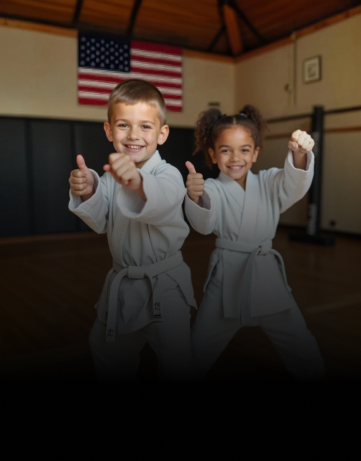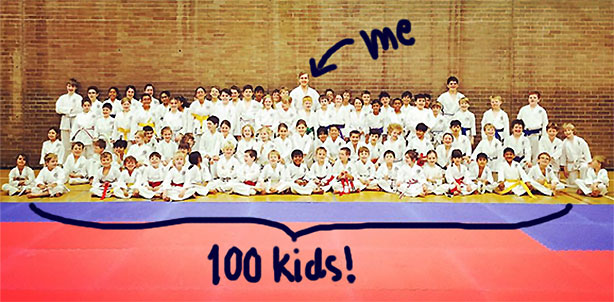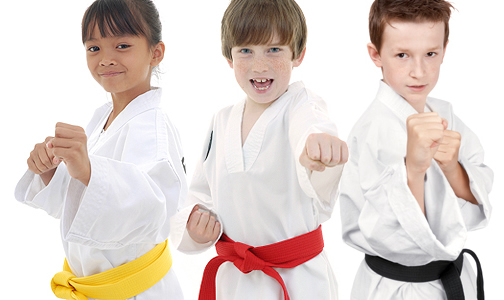Martial Arts Salisbury MD – Where Kids Discover Focus, Courage, and Enjoyment
Wiki Article
How Martial Arts for Kids Can Increase Self-confidence and Self-control in Youthful Martial Artists
Karate for children offers an one-of-a-kind possibility to develop self-confidence and self-control in young martial artists. As they learn new techniques and face obstacles, they not only get abilities yet likewise create a solid feeling of self-respect. This organized atmosphere motivates them to appreciate the trip of improvement. Just how does this training convert into their everyday lives? Discover the deeper links that make karate greater than simply a sporting activity.The Relevance of Confidence in Childhood Growth
Self-confidence is a crucial structure block in childhood years advancement. When you nurture your kid's self-worth, you encourage them to encounter difficulties, take threats, and express themselves freely. Kids with confidence are more ready to discover social circumstances and new tasks, which can result in long lasting friendships and important experiences.Encouraging your child to get out of their convenience zone cultivates strength. They learn that failure isn't the end but instead a stepping stone to success. By celebrating their success, despite just how little, you assist them recognize their capabilities and worth.In this journey, assistance and positive support from you play a vital function. Whether it's through praise or simply being present, your participation improves their self-confidence. As they grow, this self-assurance comes to be a lifelong asset, outfitting them to navigate both difficulties and chances with a solid sense of self.Just How Karate Shows Technique and Emphasis
Martial arts helps you develop self-control and focus through its structured training program. As you exercise mindfulness throughout each session, you'll learn to focus much better both on and off the floor covering. And also, establishing and attaining goals in karate reinforces your capacity to remain alert and fully commited.Structured Training Regimen
While you participate in karate training, you'll rapidly find how a structured program infuses discipline and emphasis in young practitioners. Each course follows a certain format, including workouts, strategy practice, and sparring. This consistency instructs you to commit and respect the procedure to enhancement. As you discover strategies and kinds, you establish a sense of responsibility for your very own progress.The structured environment urges you to establish objectives, whether mastering a brand-new belt or improving a kata. You'll find that remaining concentrated during drills and classes sharpens your focus. The self-control you cultivate in karate expands past the dojo, positively affecting your schoolwork and daily regimens. Each session enhances the value of dedication, aiding you grow into an extra regimented person.Mindfulness in Practice
As you practice martial arts, you'll locate that mindfulness ends up being an important part of your training. Each move needs your full interest, aiding you remain concentrated on the existing minute. You'll learn to ignore diversions and focus on your breathing, motions, and purposes. This increased awareness sharpens your reflexes and boosts your discipline.During sparring or forms, you'll discover the importance of being psychologically present - Karate Salisbury MD. You'll see exactly how this emphasis not only boosts your strategy however additionally develops your confidence. By practicing mindfulness in karate, you grow persistence and strength, necessary traits that expand past the dojo. By doing this, martial arts instructs you to harness your mind, aiding you develop a regimented approach to obstacles both on and off the mat
Setting Goal Techniques
Establishing goals in martial arts isn't nearly earning belts; it's an effective way to cultivate discipline and focus. When you set certain, possible targets, you develop a roadmap for your progress. Instead of simply aiming to boost your kicks, try concentrating on mastering a particular method each month. This approach keeps you inspired and engaged.Breaking down larger goals into smaller, convenient steps helps you track your development and commemorate small victories along the method. Whether it's perfecting your stance or raising your sparring endurance, every goal reinforces your dedication. As you accomplish these goals, you'll develop confidence in your skills and develop a solid feeling of discipline that expands beyond the dojo into day-to-day life.Structure Resilience Through Martial Arts
Martial arts, specifically karate, offers youngsters a special opportunity to construct durability in a helpful setting. In classes, they face challenges that push their restrictions, whether it's grasping a brand-new strategy or competing with a companion. Each problem, like a missed kick or a lost suit, comes to be a chance to find out and grow.As they exercise, kids find out to welcome discomfort and maintain trying, also when things obtain difficult. They uncover that failing isn't completion; it belongs to the journey. This way of thinking helps them bounce back stronger, not just in the dojo, however in everyday life.With each obstacle they overcome, your kid constructs self-confidence in their ability to tackle obstacles, sustaining their resolution. Via karate, they'll comprehend highest paid nba player that durability isn't almost physical strength; it's regarding mental grit and perseverance, equipping them to deal with whatever life throws their method.The Duty of Regard in Karate Educating
Respect is a fundamental principle in karate training, promoting a culture of discipline and camaraderie amongst pupils. When you step onto the dojo floor, you're not just discovering strategies; you're also learning to respect your trainers, peers, and the art itself (Karate Salisbury MD). Bowing at the start and end of course isn't simply a rule; it symbolizes your recommendation of others' dedication.as and efforts you establish shared respect, you'll find it boosts your learning experience. You'll listen extra diligently to your trainer and gain insights from fellow students. This atmosphere urges useful criticism and assistance, permitting everybody to grow together.Moreover, respect cultivates self-control. Acknowledging the worth of difficult work and humility helps you remain concentrated on your training. In turn, this respect equates into your everyday life, improving your interactions and partnerships outside the dojo. Through martial arts, you learn that regard is necessary for personal development and neighborhood structureAccomplishing and setting objectives Success in Karate

Social Skills and Team Effort in the Dojo
While training in the dojo, kids naturally establish crucial social abilities and synergy abilities. As they practice along with peers, they learn to connect efficiently, share space, and assistance each other. Each class provides opportunities for cooperation, whether it's throughout partner drills or group exercises. This teamwork cultivates friendships and develops a sense of belonging, making the dojo a nurturing environment.Kids also get beneficial dispute resolution skills. When they come across difficulties, such as disputes during sparring, they find out to browse these scenarios constructively. They exercise persistence and compassion, comprehending that everybody has different strengths and weaknesses.Moreover, getting involved in team tasks cultivates a feeling of responsibility. You'll see your youngster finding out to rely upon teammates and take duty for their role in a team. These experiences not only enhance their martial arts journey however also furnish them with social tools they'll you could look here carry right into other locations of life.
The Long-Term Conveniences of Karate Beyond Childhood Years
As kids expand up and change into the adult years, the benefits of karate extend far beyond the dojo. You'll locate that the discipline and emphasis learned via martial arts can equate into your professional and scholastic life. Establishing and achieving objectives in martial arts promotes a strong job principles, which can push you to master any type of endeavor.Moreover, the self-confidence obtained from competing and understanding strategies can improve your self-esteem, helping you deal with difficulties head-on. This resilience ends up being indispensable as you encounter the uncertainties of adulthood.Additionally, the social abilities created via teamwork and sociability in the dojo can lead to much better relationships in both individual and expert rounds. You'll learn to interact properly, willpower conflicts, and build an encouraging network.Ultimately, karate shapes not just competent martial musicians, yet all-round people all set to tackle the world.Frequently Asked Inquiries
What Age Is Best to Begin Martial Arts for Children?
You can begin martial arts as early as age four or 5, yet it often relies on your child's maturity and interest. Discovering a class that matches their age and energy level makes a large difference.Are There Any Health Conveniences From Exercising Martial Arts?
Yes, exercising karate deals many health and wellness advantages. You'll boost your flexibility, stamina, and control while enhancing cardiovascular physical fitness. Plus, it enhances focus and psychological health, making it a superb selection for general physical and mental wellness.Exactly How Usually Should Kids Attend Martial Arts Classes?
You ought to motivate your children to go to karate classes at the very least 2 to three times a week. Uniformity helps them find out strategies properly and develop abilities, making their experience extra enjoyable and fulfilling in the future.Can Karate Aid With Managing Anxiousness in Children?
Yes, karate can assist handle stress and anxiety in youngsters. It educates focus and self-discipline while giving a secure electrical outlet for energy. You'll notice your youngster expanding a lot more certain and calm as they practice consistently.What Equipment Is Required for Children Starting Martial Arts?

Report this wiki page